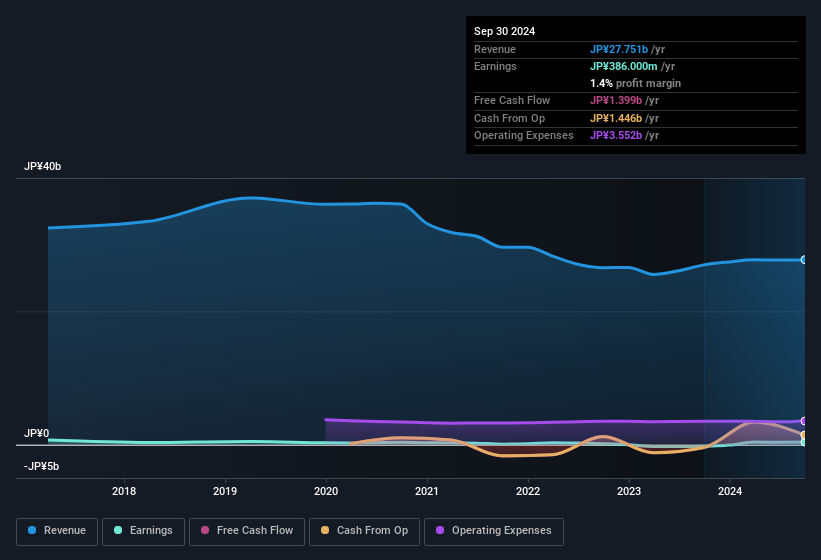- Japan
- /
- Trade Distributors
- /
- TSE:7677
Solid Earnings Reflect YashimaLtd's (TSE:7677) Strength As A Business

Yashima & Co.,Ltd. (TSE:7677) announced strong profits, but the stock was stagnant. We did some digging, and we found some concerning factors in the details.
Check out our latest analysis for YashimaLtd

Zooming In On YashimaLtd's Earnings
In high finance, the key ratio used to measure how well a company converts reported profits into free cash flow (FCF) is the accrual ratio (from cashflow). To get the accrual ratio we first subtract FCF from profit for a period, and then divide that number by the average operating assets for the period. You could think of the accrual ratio from cashflow as the 'non-FCF profit ratio'.
As a result, a negative accrual ratio is a positive for the company, and a positive accrual ratio is a negative. That is not intended to imply we should worry about a positive accrual ratio, but it's worth noting where the accrual ratio is rather high. That's because some academic studies have suggested that high accruals ratios tend to lead to lower profit or less profit growth.
For the year to September 2024, YashimaLtd had an accrual ratio of -0.87. That indicates that its free cash flow quite significantly exceeded its statutory profit. In fact, it had free cash flow of JP¥1.4b in the last year, which was a lot more than its statutory profit of JP¥386.0m. Notably, YashimaLtd had negative free cash flow last year, so the JP¥1.4b it produced this year was a welcome improvement. Having said that, there is more to the story. The accrual ratio is reflecting the impact of unusual items on statutory profit, at least in part.
Note: we always recommend investors check balance sheet strength. Click here to be taken to our balance sheet analysis of YashimaLtd.
How Do Unusual Items Influence Profit?
While the accrual ratio might bode well, we also note that YashimaLtd's profit was boosted by unusual items worth JP¥146m in the last twelve months. We can't deny that higher profits generally leave us optimistic, but we'd prefer it if the profit were to be sustainable. When we analysed the vast majority of listed companies worldwide, we found that significant unusual items are often not repeated. And that's as you'd expect, given these boosts are described as 'unusual'. YashimaLtd had a rather significant contribution from unusual items relative to its profit to September 2024. All else being equal, this would likely have the effect of making the statutory profit a poor guide to underlying earnings power.
Our Take On YashimaLtd's Profit Performance
YashimaLtd's profits got a boost from unusual items, which indicates they might not be sustained and yet its accrual ratio still indicated solid cash conversion, which is promising. Based on these factors, it's hard to tell if YashimaLtd's profits are a reasonable reflection of its underlying profitability. If you want to do dive deeper into YashimaLtd, you'd also look into what risks it is currently facing. For example, YashimaLtd has 3 warning signs (and 1 which is potentially serious) we think you should know about.
Our examination of YashimaLtd has focussed on certain factors that can make its earnings look better than they are. But there are plenty of other ways to inform your opinion of a company. Some people consider a high return on equity to be a good sign of a quality business. While it might take a little research on your behalf, you may find this free collection of companies boasting high return on equity, or this list of stocks with significant insider holdings to be useful.
New: Manage All Your Stock Portfolios in One Place
We've created the ultimate portfolio companion for stock investors, and it's free.
• Connect an unlimited number of Portfolios and see your total in one currency
• Be alerted to new Warning Signs or Risks via email or mobile
• Track the Fair Value of your stocks
Have feedback on this article? Concerned about the content? Get in touch with us directly. Alternatively, email editorial-team (at) simplywallst.com.
This article by Simply Wall St is general in nature. We provide commentary based on historical data and analyst forecasts only using an unbiased methodology and our articles are not intended to be financial advice. It does not constitute a recommendation to buy or sell any stock, and does not take account of your objectives, or your financial situation. We aim to bring you long-term focused analysis driven by fundamental data. Note that our analysis may not factor in the latest price-sensitive company announcements or qualitative material. Simply Wall St has no position in any stocks mentioned.
About TSE:7677
YashimaLtd
Engages in the sale, maintenance, and import/export of railway related products and electronic parts for industrial machines in Japan and internationally.
Flawless balance sheet low.
Market Insights
Community Narratives




